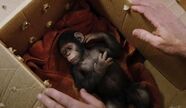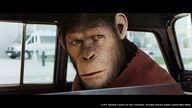first glance, "Rise of the Apes " looks like the latest version of an ancient story. At the beginning of the 19th century, Mary Shelley, the wife of English poet Shelley, published the first science fiction novel "Frankenstein" in Western history. The protagonist of the novel is a Frankenstein named Frankenstein, who created an ugly monster through biological experiments. The monster seemed very friendly at first, but he was disgusted and discriminated everywhere, because he became hostile to humans. He killed Frankenstein's brother William, and finally died with Frankenstein in the fight. This novel became the prototype of a series of later science fiction movies, such as "Bloodbath Paradise", "The Invisible Man" and "The Hulk". Technological progress is a Pandora's box, which, while promoting human civilization, also releases huge potential for destruction. In "Rise of the Apes", scientist Will's phrase "You don't know what you are doing!" can be said to be a warning against technological progress.
Some film critics believe that in addition to first-class special effects, the meaning of "Rise of the Apes" is nothing more than this. In the author's opinion, the film has profound political connotations and helps us understand human political activities. The American sociologist Seymour Lipset famously said: "Those who only know one country know no country." (Those who only know one country know no country.) Don't know any animals. As the most powerful species on earth, we often call ourselves the spirit of all things. However, molecular biology has revealed the close relationship between humans and apes, and American scholar Jared Diamond even called humans "the third type of orangutans." The primatologist Val, who has been investigating in the jungle for a long time, found that chimpanzees exhibit social behaviors similar to humans, such as adopting specific offensive strategies in order to gain leadership.
Since "human beings are different from animals and animals," why do humans rule chimpanzees instead of chimpanzees dominating humans? American political scientist Fukuyama tried to answer this question in his new book The Origin of Political Order. In Fukuyama's view, due to various unclear historical conditions, humans have evolved a high degree of intelligence, language instinct, and empathy. This allows us to cooperate to a greater extent and establish highly developed political organizations. In the era of hunting tribes, the competitive advantage of humans over apes was not obvious; in the era of nation-states, humans already possess nuclear weapons, and chimpanzees still only throw stones.
The establishment of the zoo symbolizes that mankind will eventually become the overlord of the earth. Mankind’s “tyranny” towards beasts does not need to ask for their consent, nor does it need to consider their resistance. When the American founding fathers declared that "all men are created equal," they probably would not consider whether other primates also have inherent rights. The French novelist Pierre Boulle, the author of "Planet of the Apes", once observed the similarities between gorillas and humans. The way humans treat animals remains to be discussed by political philosophers. Here the author does not want to be involved in the lengthy discussion about animal rights, but just want to point out one thing: people do give higher animals more care in practice. This is why a cat abuse incident will cause public outrage, and wailing a dead cockroach can only be a joke.
In "Rise of the Apes", the ape group riot led by the chimpanzee "Caesar" uses humans as enemies, but it can easily touch the sympathy of the audience. This is not because chimpanzees can solve complex problems—computers do better, but because they fight for dignity like humans. In order to win dignity, "Caesar" rejected the easy pet life and chose to lead the apes struggle. This plot reminds us of Nora's story in "Doll's House". The screenwriter of "Rise of the Apes" was one step closer than Ibsen and answered "What happened after Nora left?" Fukuyama also emphasized in the book that political activities are not only about the survival of the individual, but also point to the demands of dignity in human nature.
After the great geographical discovery at the end of the 15th century, Europeans began to travel around the world. They met many "uncivilized" indigenous peoples in America, Africa, and Oceania, and regarded these people as "inferior humans" or even talking apes. Although Europeans have a sense of racial superiority, people in other regions have gradually learned to organize armed forces in the European way. In the Russo-Japanese War of 1904, the yellow race defeated the white race for the first time, and Japan also used this to “leave Asia and enter Europe” and join the clubs of Western powers. In the anti-colonial struggle after World War II, those countries that won sovereignty finally won the dignity for their nation, and they can say "no" like "Caesar". In this sense, "Rise of the Planet of the Apes" is actually a film about the liberation movement of disadvantaged groups-the political equality between primates ultimately depends on their comparison of force.
Technological development is a long process, and it is impossible to make chimpanzees smart in a short period of time. We need to worry about the social inequality that biotechnology may cause. Intergenerational mobility is regarded as the normal state of modern society. This is largely due to the random distribution of intelligence in the population, and the top people in the bottom of the population may therefore also rise up with the help of educational opportunities. However, once drugs that help improve IQ come out, the elites are likely to benefit first, thereby strengthening their ruling power. In other words, rich people not only make their children rich, but also make them smart. In this case, intergenerational mobility will stall, and it is even possible for humans to re-enter a privileged society based on descent. Should we restrict the research and development of this type of biomedicine in the same way that the Olympic Organizing Committee bans stimulants? Or should we try to get all population groups to share such drugs?
I don't have a definite answer at the moment, so I leave it to the reader to think about it.
View more about Rise of the Planet of the Apes reviews











